人教版九年级下册Unit 10 You're supposed to shake hands.非谓语动词课件(共39张PPT)
文档属性
| 名称 | 人教版九年级下册Unit 10 You're supposed to shake hands.非谓语动词课件(共39张PPT) |  | |
| 格式 | ppt | ||
| 文件大小 | 994.0KB | ||
| 资源类型 | 教案 | ||
| 版本资源 | 人教新目标(Go for it)版 | ||
| 科目 | 英语 | ||
| 更新时间 | 2023-03-16 16:06:27 | ||
图片预览




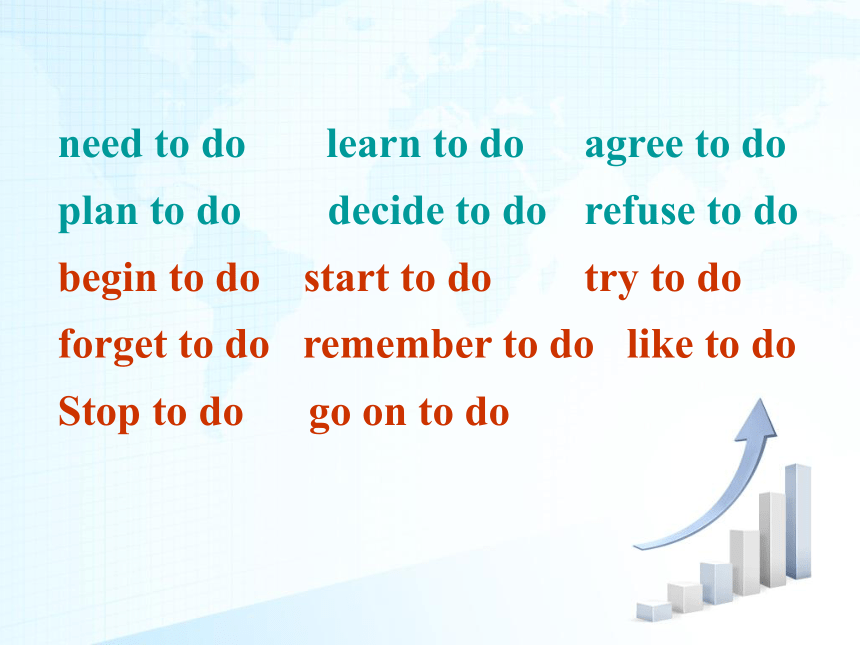
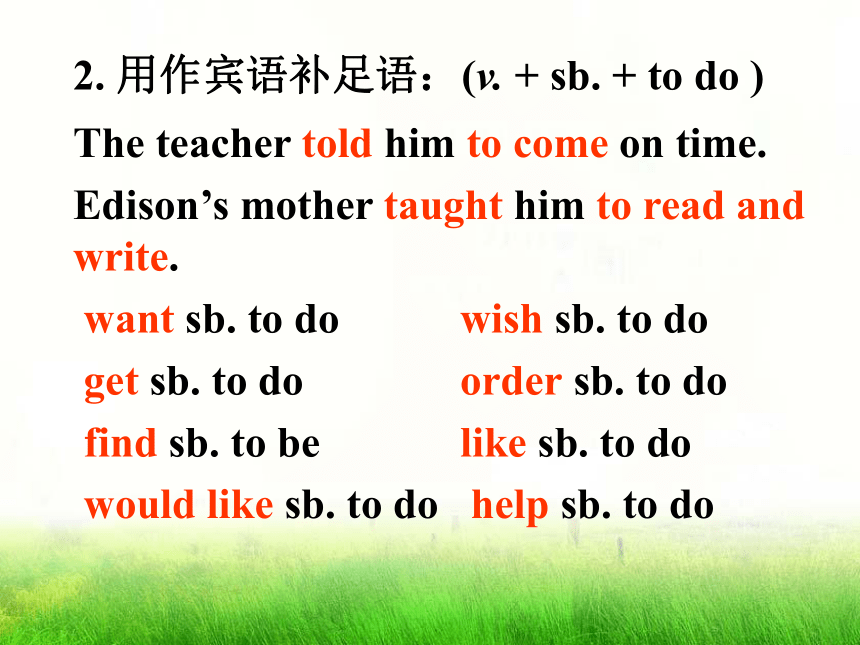
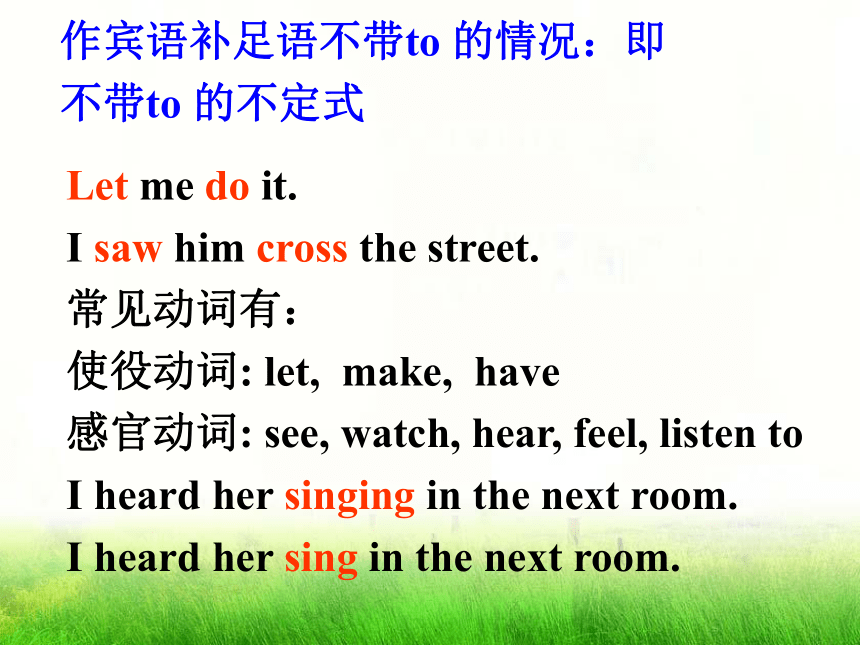
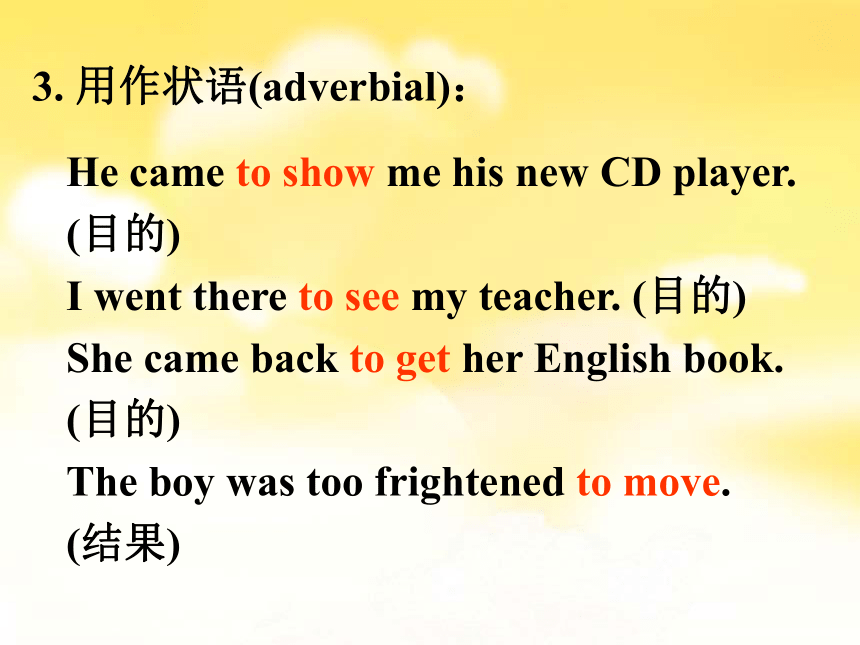


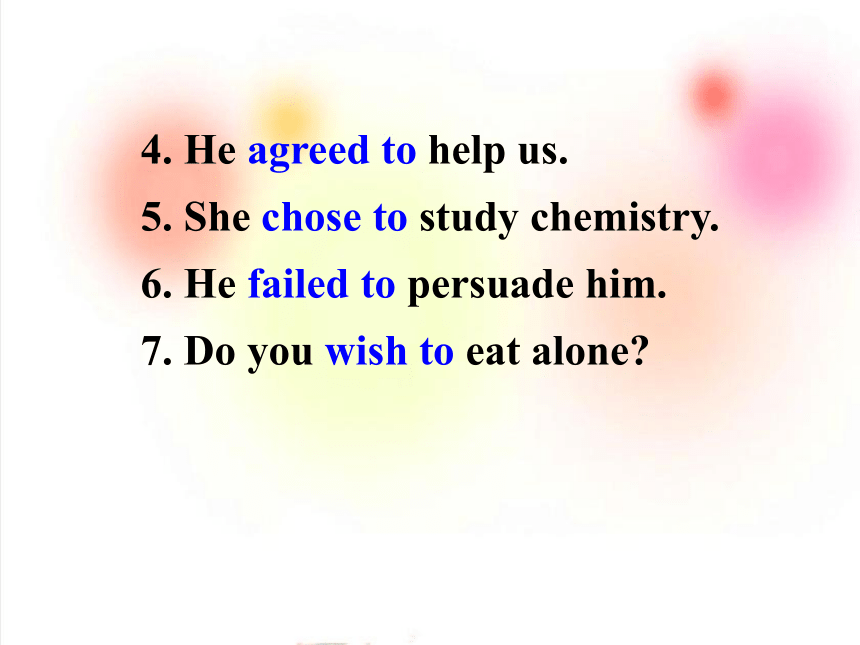
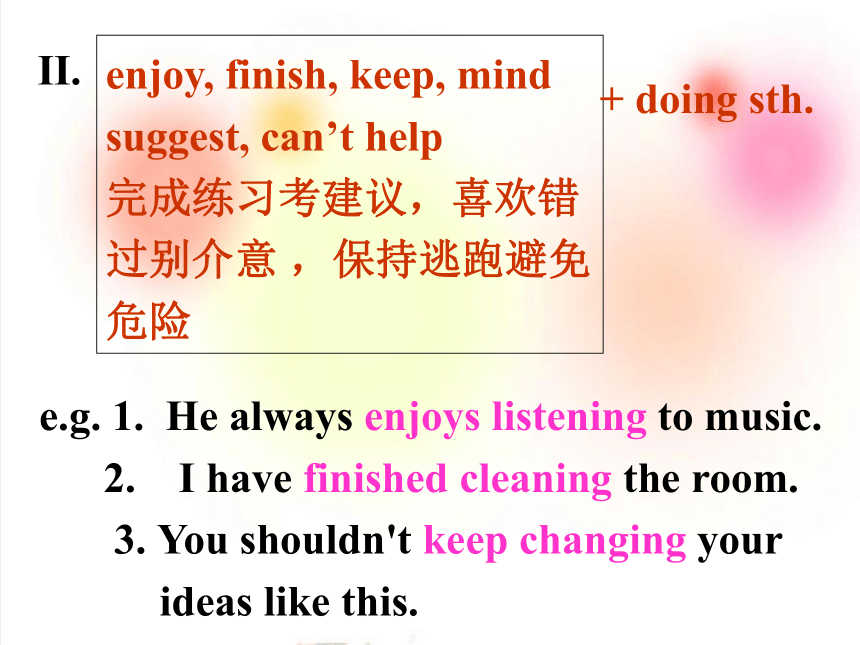
文档简介
(共39张PPT)
非谓语动词
学习目标:中考非谓语动词的主要考点
1.动词不定式作宾语、宾语补足语、目的状语的用法。
2.动名词的用法。
3.分词的用法
4.短语动词
动词不定式
动词不定式的基本形式是“to+动词原形“, 有时可以不带to.动词不定式没有人称和数的变化, 在句子中不能作谓语。在句中可以作主语、表语、宾语、宾语补足语、定语和状语。
构成:to + do(动词原形)
用法:
1. 用作宾语 (v. + to do )
I want to buy a computer.
She hopes to find a better job.
I wish to go with you.
need to do learn to do agree to do
plan to do decide to do refuse to do
begin to do start to do try to do
forget to do remember to do like to do
Stop to do go on to do
2. 用作宾语补足语:(v. + sb. + to do )
The teacher told him to come on time.
Edison’s mother taught him to read and write.
want sb. to do wish sb. to do
get sb. to do order sb. to do
find sb. to be like sb. to do
would like sb. to do help sb. to do
作宾语补足语不带to 的情况:即不带to 的不定式
Let me do it.
I saw him cross the street.
常见动词有:
使役动词: let, make, have
感官动词: see, watch, hear, feel, listen to
I heard her singing in the next room.
I heard her sing in the next room.
3. 用作状语(adverbial):
He came to show me his new CD player. (目的)
I went there to see my teacher. (目的)
She came back to get her English book. (目的)
The boy was too frightened to move. (结果)
4.用作主语
To be here at Christmas time is my dream.
2. To go abroad is his dream.
3. To say is easy, to do is difficult.
(这时可将其用形式主语it来替换)
→It is my dream to be here at Christmas time.
→ It is his dream to go abroad.
→ It is easy to say, it is difficult to do.
动词不定式和动词-ing形式
中考考查重点讲解
e.g. 1. He has promised to behave better later.
2. The boy decided not to become a sailor.
3. I hope to go to college.
promise, decide, hope, agree, choose, fail, wish, learn
+ to do sth.
I.
4. He agreed to help us.
5. She chose to study chemistry.
6. He failed to persuade him.
7. Do you wish to eat alone
enjoy, finish, keep, mind suggest, can’t help
完成练习考建议,喜欢错过别介意 ,保持逃跑避免危险
e.g. 1. He always enjoys listening to music.
2. I have finished cleaning the room.
3. You shouldn't keep changing your ideas like this.
+ doing sth.
II.
love, hate, forget, remember stop, like, try, mean
+
to do sth.
doing sth.
1. Mary loves _______________.
2. I hate to _____________________.
3. 她忘记寄这封信了。
She forgot __________________.
reading / to read
trouble / troubling him
to post the letter
III.
4. 我永远忘不了初次寄信的情景。
I'll never forget _______ a letter for the first time.
5. I remember ______ her once.
= I remember that I ____ ( see )her once.
6. Remember ________ me.
= I hope you’ll phone me.
posting
seeing
saw
to phone
他停下来跟我说话。He stopped ______________.
他停止讲话 He stopped _______.
他喜欢游泳。He likes _________.
我不想打扰你。I don't like _____________.
她试着写作文。She tried ____________________.
to talk with me
talking
swimming
to disturb you
writing a composition
IV.
ask, tell, get, wish, want, teach, know, understand
1. I asked him _______ here early.
2. Get him _____ a doctor. 劝他去找医生看看。
3. I've known him _____ very fast. 我听说他跑得比较快。
4. What did you understand him _____ 你认为他说的是什么意思呢?
+ sb. to do sth.
to come
to see
to run
to say
make, have, let, see, watch, hear, feel , notice
+ sb. do sth.
e.g. I can't make the horse go. 我无法使这匹马走动。
I won’t have (允许,容许) you say such things. 我可不许你说这样的话。
My mother wouldn't let me go to the film. 我妈妈不会让我去看电影的。
Did you notice him leave the house 你看到他离开房间了吗?
I often hear him sing the song.
V.
sb. + be done + to do sth.
e.g He is often heard ______ the song.
They were made _______ day and night.
to sing
to work
Ⅵ.
be +
happy, glad, pleased angry, sorry, lucky
slow, quick, careful ready, nice
+ to do sth.
e.g I am sorry to hear that.
He is wrong to say so.
I was very lucky to get a copy so cheap. “我这么便宜地买到一本,真是幸运极了。
** quick to learn sth. **
学某事学得快
Be careful not to fall off the ladder.当心别从梯子上掉下来。
He is ready to help . 愿意帮忙
Ⅶ.
e.g. I found it very important to learn English well.
= I found that _ ____ very important to learn English well.
I feel it my duty to do so.
= I feel that _ _ my duty to do so.
think, make, find, feel
+ it + adj. / n + to do sth.
it was
it is
It’s +
+ ( for + sb. ) + to do sth.
It’s +
difficult, hard, easy,
possible, impossible
important,`
+ (of + sb.) + to do sth.
clever,wise, kind, good, right, nice
wrong, bad, cruel silly, stupid, foolish
careful, careless
Ⅷ .
e.g It is hard ___ you to do it well.
= For you to do it well is hard.
It is kind ___ you to help me.
= You are kind to help me.
for
of
It’s clever __ him to say so.
It is impossible __ you to finish it.
It was wrong __ you to tell a lie.
It was careless ___ you to make so many
mistakes in the exam.
It is silly __ her to do such a thing.
It is important ___ you to learn English well.
of
for
of
of
of
for
e.g
Ⅸ.
e.g They had no room to live ___.
The pen is very good to write ____.
The chair is nice to sit __.
what / where / when / how / why + to do sth.
e.g. How to do it is still a question.
Have you decided when to hold the party
in
with
on
Ⅹ.
Exercises
1. -- You’ve done very well this time.
-- It’s really kind ______.
A. for you to say so B. for you saying so
C. of you to say so D. of you saying so
2. It is better to lose one’s life than ____.
A. if you lose your spirit
B. losing his spirit
C. to lose one’s spirit
D. your spirit getting lost
C
C
3. – I can’t work in this way.
-- Why not ____ it in some other way
A. try to do B. try doing
C. trying to do D. trying doing
4. Since you find it difficult ____ a decision, you’d better a discussion( 讨论) with your parents.
A. reach; have B. reaching; have
C. reach; having D. to reach; have
B
D
5. My father hates(痛恨) ___. He never allows me _____.
A. to smoke; to smoke
B. smoking; smoking
C. smoke; smoking
D. smoking; to smoke
6. The girl was beginning ___.
A. get angry B. to get angry
C. getting angry D. angry
D
B
7. There isn’t any difference between the two. I really don’t know ________.
A. where to choose B. which to choose
C. what to choose D. to choose which
8. The bag is too heavy for me _______.
A. to carry it B. not to carry it
C. to carry D. not to carry
9. The teacher will teach him _______.
A. to use B. use it
C. how to use it D. uses
B
C
C
现在分词和过去分词
① 主要区别:现在分词一般有主动的意思或表示动作正在进行的意思;过去分词有被动或动 作已经完成的意思。分词可以有自己的宾语或状语。
作定语:分词作定语时,一般要放在修饰的名词之前,分词短语作定语时,则要放在所修饰的名词之后。 如:I have got a running nose.(我流鼻涕) / The woman running after the thief shouted very loudly,“Stop the thief!”(跟着小偷追的妇女大喊:捉小偷!) / Yesterday I met a man called Mr. Black.
现在分词可以作状语,表示伴随情况。如:She came into the classroom,holding a pile of papers in her hand.
过去分词可以作宾语补足语。如:I had my hair cut this morning.(今天早上我让人给我理了发)
(注意:get/have sth. done表示动作由别人来做
get dressed (打扮好) / get lost (迷路)
动词及动词短语用法辨析:
(1)“Why not+动词原形+… ”(干嘛不…… )是简略句,完全形式是:Why don’t you +动词原形+… 如:Why not go and have a look
Why not try it once again
(2) make 与do的用法:表示进行活动或者做工作用do,表示创造建构某事物用make.
记住一些固定说法:do good / harm / business / one’s best / a favour……
make a decision / an effort / a mistake / a noise / a phone call / money / war / the bed / sure,...
(3)put on、wear、have…on、be in、try on、dress的用法:put on强调“穿、戴”这个动作过程,wear则表示“穿着、戴着”这一状态,have+衣物+on主要表示状态,be in(+颜色/衣物)也是,dress(+人)表示“给…人穿衣”。
(4)look for、search…for、find、find out的用法:前面两个词语表示动作过程,后面两个表示结果,look for指“寻找”不见的或丢失的东西,但还没有找到;search…for…指“为找…而搜寻…”;find指“找到”了东西;find out主要指“查明一个事实真相”。
,find sth./sb. + adj./n.“发觉某人是…”,find it +adj. + to do…(或+宾语从句)
(5)look、see、watch、read的用法:四个词均与眼睛有关,look指放眼去“看”(不管是否看得到),指“看”的过程;see指“看见”这一结果,有时see还引申为“明白”,表示“看”时后面加“电影”等词;watch指专注的看,含有“注视、监视”之义,后面常跟“电视、比赛”等词;read限制为看书面材料,译为“看、阅读”,后面跟“书、报纸、杂志”等词。
Let me go to see the film, mum, will you (固定搭配不用watch)
6)speak、talk、say、tell的用法:四个词与“说”有关。speak“讲话、发言、演说”,是不及物动词,涉及人时要加介词to,speak作及物动词时后面跟语言名称;
talk“谈话、闲谈”,是vi,涉及人时用talk with、to Sb 等,talk aboutsb /sth等;
say 是vt,后面跟名词、代词、从句等,表示说的内容;tell是及物动词,后面首先要跟人,然后再跟从句或者介词短语等 tell sb sth, tell sb about sth
tell sb (not) to do sth , tell a story / joke/lie
(7)arrive in/at、reach、get to的用法:arrive是vi,到达县地点时用arrive at,到达一个大的地方(国家、城市)时用arrive in。get表示“到达”时是不及物动词,涉及地点(无论大小)时用get to,
arrive/get后面跟地点副词here/there/home时不能用介词。reach是及物动词,后面直接跟地点名词。
(8)be made of、be made from、be made into、be made in、be made by、be made for的区别:be made of可以看得出原材料,而be made from则看不出原材料,口语中都可以换成be made out of。 be made into表示“被制成……”,be made in表达被制造的地点,be made by表达制造的人,be made for表达被制造的目的。
(9)be used for、be used to、used to、get used to的区别:be used for + 名词/代词或动名词, be used to + 动词原形,表示两个短语意思相近,表示“被用于…”。 used to + 动词原形,表示“过去常常”,否定式可以是“didn’t use to”也可以是“usedn’t to”;get/be used to + doing ,表示“习惯于….”。
(10)join、join in、take part in的区别:join多指参加组织、团体、党派等,join sb表示和某人一起参加某项活动;join in指参加某项游戏或活动;take part in多指参加群众性的活动、运动、会议等
attend 多用于 出席会议 attend the meeting
(11)warn的用法:“warn sb. of/about sth”意思是“针对…而警告某人”;“warn sb (not) to do sth”意思是“告戒某人(不)要做某事”;“warn sb. + that从句”意思是“警告某人说……”。
(12)think of与think about等短语的区别:think of表示“考虑、思念、认为、想起、建议”等;“think about”表示“看待、认为”;“think much /highly /a lot of”表示“高度评价…”;“think over”表示“仔细考虑”;“think out”表示“想出”
13)agree with/ agree to / agree on等词语用法:“agree to+动词”表示“同意做某事”,“agree with + sb./观点”表示“赞同…的观点”/ agree about表示“对…话题有相同看法”/“agree to +建议”表示“同意”某人的建议,“agree on + 决定”表示“赞成某人的决定”。
(14)prefer to…rather than…与prefer…to…的区别:prefer to do rather than do后面都是用动词原形,prefer…to…都是用动名词或名词。
prefer sth (doing) to sth (doing)
如:I prefer English to Japanese. I prefer to learn English rather than learn Japanese. (与日语相比我更喜欢学英语)
非谓语动词
学习目标:中考非谓语动词的主要考点
1.动词不定式作宾语、宾语补足语、目的状语的用法。
2.动名词的用法。
3.分词的用法
4.短语动词
动词不定式
动词不定式的基本形式是“to+动词原形“, 有时可以不带to.动词不定式没有人称和数的变化, 在句子中不能作谓语。在句中可以作主语、表语、宾语、宾语补足语、定语和状语。
构成:to + do(动词原形)
用法:
1. 用作宾语 (v. + to do )
I want to buy a computer.
She hopes to find a better job.
I wish to go with you.
need to do learn to do agree to do
plan to do decide to do refuse to do
begin to do start to do try to do
forget to do remember to do like to do
Stop to do go on to do
2. 用作宾语补足语:(v. + sb. + to do )
The teacher told him to come on time.
Edison’s mother taught him to read and write.
want sb. to do wish sb. to do
get sb. to do order sb. to do
find sb. to be like sb. to do
would like sb. to do help sb. to do
作宾语补足语不带to 的情况:即不带to 的不定式
Let me do it.
I saw him cross the street.
常见动词有:
使役动词: let, make, have
感官动词: see, watch, hear, feel, listen to
I heard her singing in the next room.
I heard her sing in the next room.
3. 用作状语(adverbial):
He came to show me his new CD player. (目的)
I went there to see my teacher. (目的)
She came back to get her English book. (目的)
The boy was too frightened to move. (结果)
4.用作主语
To be here at Christmas time is my dream.
2. To go abroad is his dream.
3. To say is easy, to do is difficult.
(这时可将其用形式主语it来替换)
→It is my dream to be here at Christmas time.
→ It is his dream to go abroad.
→ It is easy to say, it is difficult to do.
动词不定式和动词-ing形式
中考考查重点讲解
e.g. 1. He has promised to behave better later.
2. The boy decided not to become a sailor.
3. I hope to go to college.
promise, decide, hope, agree, choose, fail, wish, learn
+ to do sth.
I.
4. He agreed to help us.
5. She chose to study chemistry.
6. He failed to persuade him.
7. Do you wish to eat alone
enjoy, finish, keep, mind suggest, can’t help
完成练习考建议,喜欢错过别介意 ,保持逃跑避免危险
e.g. 1. He always enjoys listening to music.
2. I have finished cleaning the room.
3. You shouldn't keep changing your ideas like this.
+ doing sth.
II.
love, hate, forget, remember stop, like, try, mean
+
to do sth.
doing sth.
1. Mary loves _______________.
2. I hate to _____________________.
3. 她忘记寄这封信了。
She forgot __________________.
reading / to read
trouble / troubling him
to post the letter
III.
4. 我永远忘不了初次寄信的情景。
I'll never forget _______ a letter for the first time.
5. I remember ______ her once.
= I remember that I ____ ( see )her once.
6. Remember ________ me.
= I hope you’ll phone me.
posting
seeing
saw
to phone
他停下来跟我说话。He stopped ______________.
他停止讲话 He stopped _______.
他喜欢游泳。He likes _________.
我不想打扰你。I don't like _____________.
她试着写作文。She tried ____________________.
to talk with me
talking
swimming
to disturb you
writing a composition
IV.
ask, tell, get, wish, want, teach, know, understand
1. I asked him _______ here early.
2. Get him _____ a doctor. 劝他去找医生看看。
3. I've known him _____ very fast. 我听说他跑得比较快。
4. What did you understand him _____ 你认为他说的是什么意思呢?
+ sb. to do sth.
to come
to see
to run
to say
make, have, let, see, watch, hear, feel , notice
+ sb. do sth.
e.g. I can't make the horse go. 我无法使这匹马走动。
I won’t have (允许,容许) you say such things. 我可不许你说这样的话。
My mother wouldn't let me go to the film. 我妈妈不会让我去看电影的。
Did you notice him leave the house 你看到他离开房间了吗?
I often hear him sing the song.
V.
sb. + be done + to do sth.
e.g He is often heard ______ the song.
They were made _______ day and night.
to sing
to work
Ⅵ.
be +
happy, glad, pleased angry, sorry, lucky
slow, quick, careful ready, nice
+ to do sth.
e.g I am sorry to hear that.
He is wrong to say so.
I was very lucky to get a copy so cheap. “我这么便宜地买到一本,真是幸运极了。
** quick to learn sth. **
学某事学得快
Be careful not to fall off the ladder.当心别从梯子上掉下来。
He is ready to help . 愿意帮忙
Ⅶ.
e.g. I found it very important to learn English well.
= I found that _ ____ very important to learn English well.
I feel it my duty to do so.
= I feel that _ _ my duty to do so.
think, make, find, feel
+ it + adj. / n + to do sth.
it was
it is
It’s +
+ ( for + sb. ) + to do sth.
It’s +
difficult, hard, easy,
possible, impossible
important,`
+ (of + sb.) + to do sth.
clever,wise, kind, good, right, nice
wrong, bad, cruel silly, stupid, foolish
careful, careless
Ⅷ .
e.g It is hard ___ you to do it well.
= For you to do it well is hard.
It is kind ___ you to help me.
= You are kind to help me.
for
of
It’s clever __ him to say so.
It is impossible __ you to finish it.
It was wrong __ you to tell a lie.
It was careless ___ you to make so many
mistakes in the exam.
It is silly __ her to do such a thing.
It is important ___ you to learn English well.
of
for
of
of
of
for
e.g
Ⅸ.
e.g They had no room to live ___.
The pen is very good to write ____.
The chair is nice to sit __.
what / where / when / how / why + to do sth.
e.g. How to do it is still a question.
Have you decided when to hold the party
in
with
on
Ⅹ.
Exercises
1. -- You’ve done very well this time.
-- It’s really kind ______.
A. for you to say so B. for you saying so
C. of you to say so D. of you saying so
2. It is better to lose one’s life than ____.
A. if you lose your spirit
B. losing his spirit
C. to lose one’s spirit
D. your spirit getting lost
C
C
3. – I can’t work in this way.
-- Why not ____ it in some other way
A. try to do B. try doing
C. trying to do D. trying doing
4. Since you find it difficult ____ a decision, you’d better a discussion( 讨论) with your parents.
A. reach; have B. reaching; have
C. reach; having D. to reach; have
B
D
5. My father hates(痛恨) ___. He never allows me _____.
A. to smoke; to smoke
B. smoking; smoking
C. smoke; smoking
D. smoking; to smoke
6. The girl was beginning ___.
A. get angry B. to get angry
C. getting angry D. angry
D
B
7. There isn’t any difference between the two. I really don’t know ________.
A. where to choose B. which to choose
C. what to choose D. to choose which
8. The bag is too heavy for me _______.
A. to carry it B. not to carry it
C. to carry D. not to carry
9. The teacher will teach him _______.
A. to use B. use it
C. how to use it D. uses
B
C
C
现在分词和过去分词
① 主要区别:现在分词一般有主动的意思或表示动作正在进行的意思;过去分词有被动或动 作已经完成的意思。分词可以有自己的宾语或状语。
作定语:分词作定语时,一般要放在修饰的名词之前,分词短语作定语时,则要放在所修饰的名词之后。 如:I have got a running nose.(我流鼻涕) / The woman running after the thief shouted very loudly,“Stop the thief!”(跟着小偷追的妇女大喊:捉小偷!) / Yesterday I met a man called Mr. Black.
现在分词可以作状语,表示伴随情况。如:She came into the classroom,holding a pile of papers in her hand.
过去分词可以作宾语补足语。如:I had my hair cut this morning.(今天早上我让人给我理了发)
(注意:get/have sth. done表示动作由别人来做
get dressed (打扮好) / get lost (迷路)
动词及动词短语用法辨析:
(1)“Why not+动词原形+… ”(干嘛不…… )是简略句,完全形式是:Why don’t you +动词原形+… 如:Why not go and have a look
Why not try it once again
(2) make 与do的用法:表示进行活动或者做工作用do,表示创造建构某事物用make.
记住一些固定说法:do good / harm / business / one’s best / a favour……
make a decision / an effort / a mistake / a noise / a phone call / money / war / the bed / sure,...
(3)put on、wear、have…on、be in、try on、dress的用法:put on强调“穿、戴”这个动作过程,wear则表示“穿着、戴着”这一状态,have+衣物+on主要表示状态,be in(+颜色/衣物)也是,dress(+人)表示“给…人穿衣”。
(4)look for、search…for、find、find out的用法:前面两个词语表示动作过程,后面两个表示结果,look for指“寻找”不见的或丢失的东西,但还没有找到;search…for…指“为找…而搜寻…”;find指“找到”了东西;find out主要指“查明一个事实真相”。
,find sth./sb. + adj./n.“发觉某人是…”,find it +adj. + to do…(或+宾语从句)
(5)look、see、watch、read的用法:四个词均与眼睛有关,look指放眼去“看”(不管是否看得到),指“看”的过程;see指“看见”这一结果,有时see还引申为“明白”,表示“看”时后面加“电影”等词;watch指专注的看,含有“注视、监视”之义,后面常跟“电视、比赛”等词;read限制为看书面材料,译为“看、阅读”,后面跟“书、报纸、杂志”等词。
Let me go to see the film, mum, will you (固定搭配不用watch)
6)speak、talk、say、tell的用法:四个词与“说”有关。speak“讲话、发言、演说”,是不及物动词,涉及人时要加介词to,speak作及物动词时后面跟语言名称;
talk“谈话、闲谈”,是vi,涉及人时用talk with、to Sb 等,talk aboutsb /sth等;
say 是vt,后面跟名词、代词、从句等,表示说的内容;tell是及物动词,后面首先要跟人,然后再跟从句或者介词短语等 tell sb sth, tell sb about sth
tell sb (not) to do sth , tell a story / joke/lie
(7)arrive in/at、reach、get to的用法:arrive是vi,到达县地点时用arrive at,到达一个大的地方(国家、城市)时用arrive in。get表示“到达”时是不及物动词,涉及地点(无论大小)时用get to,
arrive/get后面跟地点副词here/there/home时不能用介词。reach是及物动词,后面直接跟地点名词。
(8)be made of、be made from、be made into、be made in、be made by、be made for的区别:be made of可以看得出原材料,而be made from则看不出原材料,口语中都可以换成be made out of。 be made into表示“被制成……”,be made in表达被制造的地点,be made by表达制造的人,be made for表达被制造的目的。
(9)be used for、be used to、used to、get used to的区别:be used for + 名词/代词或动名词, be used to + 动词原形,表示两个短语意思相近,表示“被用于…”。 used to + 动词原形,表示“过去常常”,否定式可以是“didn’t use to”也可以是“usedn’t to”;get/be used to + doing ,表示“习惯于….”。
(10)join、join in、take part in的区别:join多指参加组织、团体、党派等,join sb表示和某人一起参加某项活动;join in指参加某项游戏或活动;take part in多指参加群众性的活动、运动、会议等
attend 多用于 出席会议 attend the meeting
(11)warn的用法:“warn sb. of/about sth”意思是“针对…而警告某人”;“warn sb (not) to do sth”意思是“告戒某人(不)要做某事”;“warn sb. + that从句”意思是“警告某人说……”。
(12)think of与think about等短语的区别:think of表示“考虑、思念、认为、想起、建议”等;“think about”表示“看待、认为”;“think much /highly /a lot of”表示“高度评价…”;“think over”表示“仔细考虑”;“think out”表示“想出”
13)agree with/ agree to / agree on等词语用法:“agree to+动词”表示“同意做某事”,“agree with + sb./观点”表示“赞同…的观点”/ agree about表示“对…话题有相同看法”/“agree to +建议”表示“同意”某人的建议,“agree on + 决定”表示“赞成某人的决定”。
(14)prefer to…rather than…与prefer…to…的区别:prefer to do rather than do后面都是用动词原形,prefer…to…都是用动名词或名词。
prefer sth (doing) to sth (doing)
如:I prefer English to Japanese. I prefer to learn English rather than learn Japanese. (与日语相比我更喜欢学英语)
同课章节目录
- Unit 1 How can we become good learners.
- Section A
- Section B
- Unit 2 I think that mooncakes are delicious!
- Section A
- Section B
- Unit 3 Could you please tell me where the restroom
- Section A
- Section B
- Unit 4 I used to be afraid of the dark.
- Section A
- Section B
- Unit 5 What are the shirts made of?
- Section A
- Section B
- Review of Units 1-5
- Unit 6 When was it invented?
- Section A
- Section B
- Unit 7 Teenagers should be allowed to choose their
- Section A
- Section B
- Unit 8 It must belong to Carla.
- Section A
- Section B
- Unit 9 I like music that I can dance to.
- Section A
- Section B
- Unit 10 You're supposed to shake hands.
- Section A
- Section B
- Review of Units 6-10
- Unit 11 Sad movies make me cry.
- Section A
- Section B
- Unit 12 Life is full of the unexpected
- Section A
- Section B
- Unit 13 We're trying to save the earth!
- Section A
- Section B
- Unit 14 I remember meeting all of you in Grade 7.
- Section A
- Section B
- Review of Units 11-14
